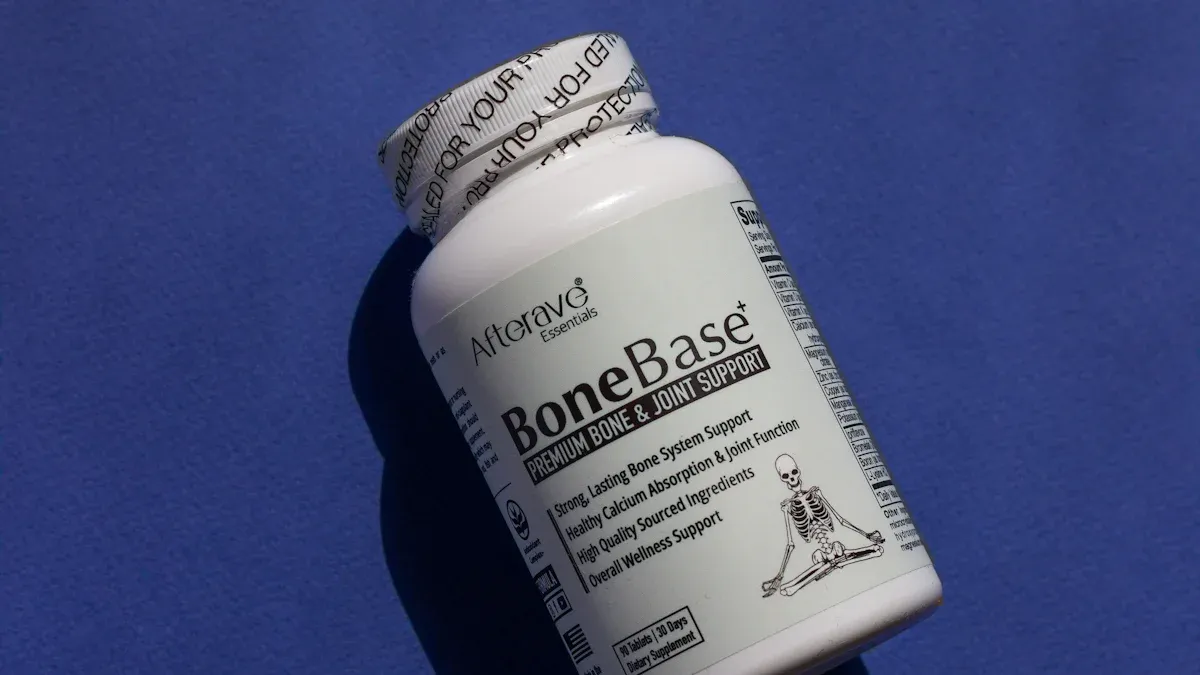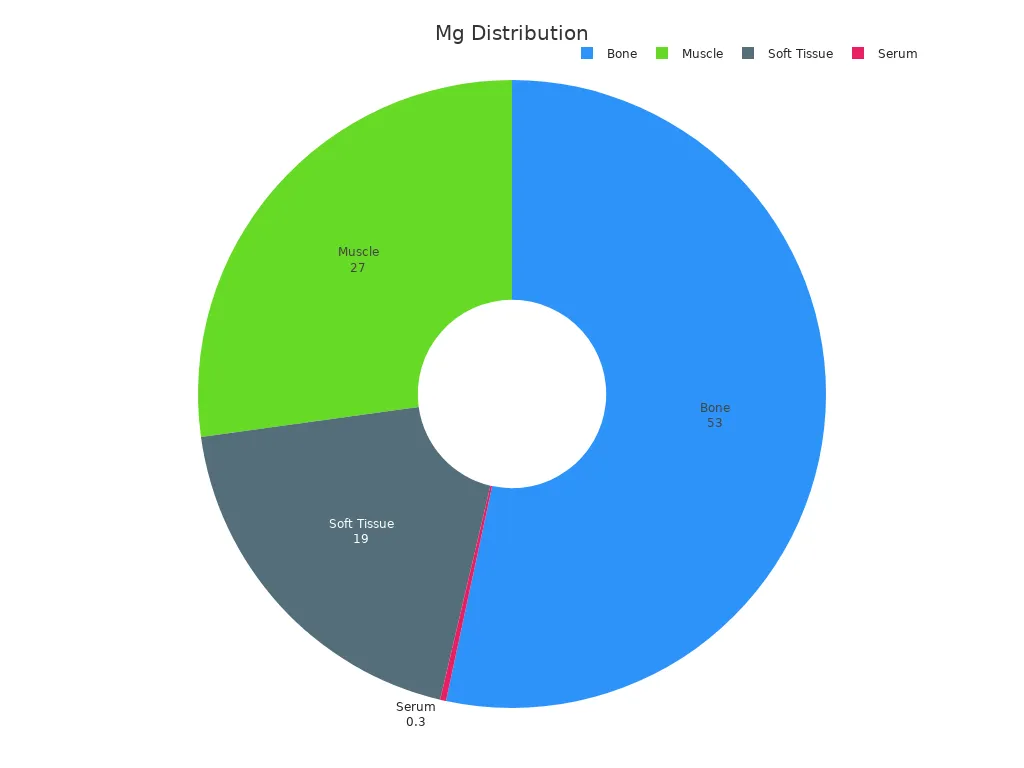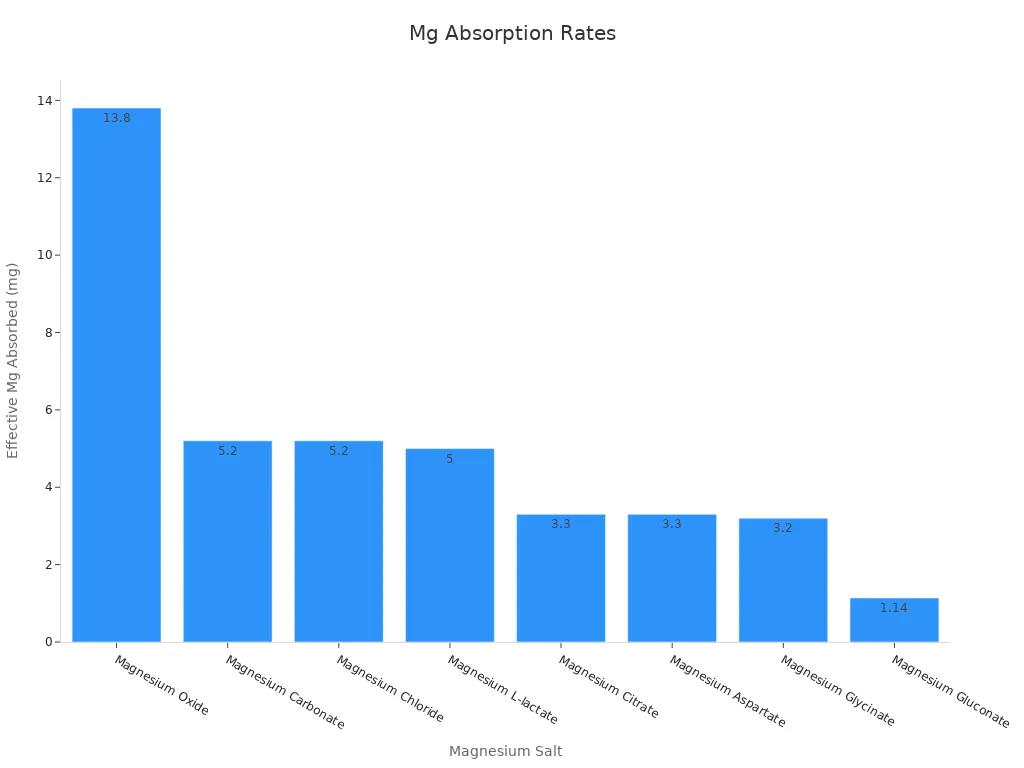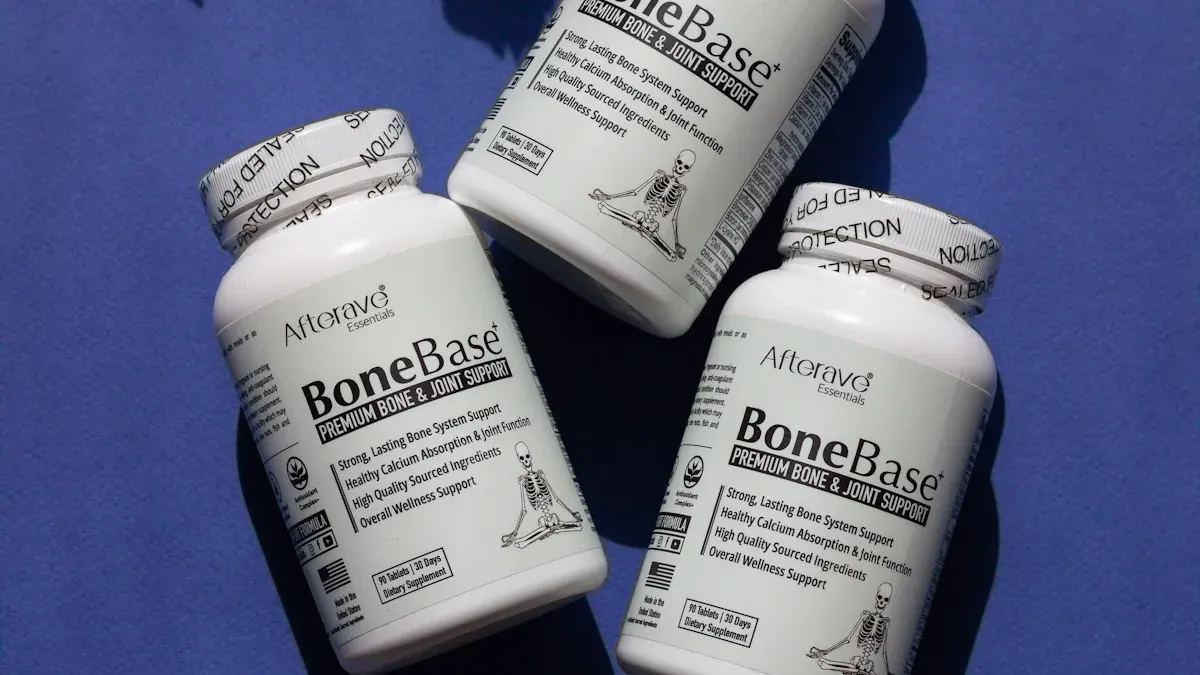
You may wonder why chelated magnesium is now popular with health experts. Chelated magnesium connects to amino acids. This helps your body take it in better than regular magnesium. Good absorption is important. Magnesium helps your nerves, muscles, and brain work well. Studies show people with low magnesium can have more problems like dementia. You need the right kind of magnesium to get all the benefits.
Key Takeaways
- Chelated magnesium sticks to amino acids, so your body takes it in better than regular magnesium. Better absorption means chelated magnesium helps your muscles, nerves, brain, and sleep more. Different types of chelated magnesium help with different things, like magnesium glycinate helps you relax and magnesium threonate helps your brain. Chelated magnesium is less likely to upset your stomach than non-chelated types like magnesium oxide. Pick the right type for your health needs, look at labels for elemental magnesium, and ask your doctor before you start supplements.
Chelated Magnesium Basics
What Is Chelated Magnesium
You might notice “chelated” on many supplement bottles. Chelation happens when magnesium sticks to something organic, like glycine. This makes a strong pair that helps your body use magnesium better. When you take chelated magnesium, it moves through your gut more easily. Your body does not have to work as hard to absorb it. This helps you get more magnesium where it is needed.
Note: Studies show chelated types, like magnesium glycinate, are absorbed better and cause less stomach trouble. Glycine in magnesium glycinate can also help you feel calm. This may help you sleep and relax your muscles.
Scientists learned that chelated magnesium stays stable in your stomach. It does not break down as fast as other kinds. Because of this, it can move through your body and reach your blood more easily.
Chelated vs. Non-Chelated
You may wonder how chelated magnesium is different from non-chelated forms. Non-chelated magnesium, like magnesium oxide, does not stick to amino acids. Your body finds it harder to take in these types. For example, research shows magnesium oxide is only absorbed about 4-7%. Chelated magnesium, like magnesium glycinate, can be absorbed 80-90%.
A study looked at people who had trouble taking in magnesium. The results showed chelated magnesium worked much better for them. It raised their magnesium levels faster and caused fewer problems.
|
Type |
Bioavailability | Common Side Effects |
|---|---|---|
|
Chelated Magnesium |
80-90% |
Rare, mild (if any) |
|
Magnesium Oxide |
4-7% |
Stomach upset, diarrhea |
|
Magnesium Citrate |
25-30% |
Mild GI discomfort |
You can see chelated magnesium gives you more good results with fewer issues. This makes it a smart pick if you want to boost your magnesium.
Absorption and Effectiveness
Why Absorption Matters
Your body needs magnesium for many things. It helps your muscles move. It keeps your nerves working right. It also helps with many chemical reactions. Even if you eat foods with magnesium, your body only uses what it can take in. The kind of supplement you pick changes how much magnesium you get.
Most magnesium in your body is in your bones and muscles. Only a small bit is in your blood. Your kidneys help control how much magnesium you keep or lose. Each day, you filter about 2400 mg of magnesium. Your kidneys save most of it. This balance keeps your muscles, nerves, and cells healthy.
| Tissue | Percentage of Total Magnesium |
|---|---|
|
Bone |
53% |
| Muscle | 27% |
| Soft Tissue | 19% |
| Serum (Blood) | 0.3% |

If you do not take in enough magnesium, you may feel tired. You might get muscle cramps. You could have trouble remembering things or focusing. Good absorption helps you avoid these problems. It also helps your health.
Bioavailability of Chelated Magnesium
Bioavailability means how much your body can use. Not all magnesium supplements work the same way. Some types, like magnesium oxide, pass through your body fast. Your body does not absorb much of them. Others, like chelated magnesium, stick to amino acids. This helps your body take in more magnesium.
Recent studies show organic forms, like magnesium citrate and chelated magnesium, work better. They have higher bioavailability than inorganic forms. A 2016 study looked at magnesium citrate and magnesium oxide. People who took magnesium citrate had more magnesium in their blood and urine. This means their bodies used more of it. A 2021 review checked many studies. It found organic magnesium forms are absorbed better, especially with the right dose.
When you pick a supplement with high bioavailability, your body gets more magnesium. This can help you feel better. It also helps your body work well.
Types of Chelated Magnesium

Magnesium Glycinate
Magnesium glycinate is in many supplements. It mixes magnesium with glycine, which is an amino acid. Your body takes in magnesium glycinate very well. Many people pick it because it is easy on the stomach. It does not usually cause diarrhea. Studies say magnesium glycinate and citrate have higher bioavailability than inorganic types. You can use magnesium glycinate to help your muscles, nerves, or sleep. Some research says it may help you feel calm and relaxed.
- Organic forms like magnesium glycinate and citrate raise magnesium in your brain and muscles.
- Taking smaller doses more often helps your body take in magnesium better.
Magnesium L- Threonate
Magnesium L-threonate is special for your brain. Scientists made this form to cross the blood-brain barrier more easily. Research shows magnesium threonate can raise magnesium in your brain. In studies, older adults who took magnesium threonate had better memory and thinking. Some people also say they sleep better and feel happier. If you want to help your brain, magnesium threonate could be a good pick.
| Study Type | Population | Key Findings | Bioavailability Evidence |
|---|---|---|---|
| Randomized, double-blind, placebo-controlled trial | Older adults (50-70 years) | Improved cognitive scores, reduced cognitive fluctuation | Superior brain magnesium elevation |
| Open-label trial | Dementia patients | Improved cognitive functioning | Supports cognitive benefits |
Magnesium Malate
Magnesium malate mixes magnesium with malic acid. Your body uses malic acid for energy. This form absorbs well and is gentle on your stomach. Animal studies show magnesium malate raises magnesium in muscles and makes them stronger. It also helps your cells make energy. If you feel tired or get muscle cramps, magnesium malate may help.
Tip: Magnesium malate helps your muscles work and gives you energy. It is a good choice for athletes or people with muscle pain.
Other Forms
There are other chelated magnesium types, like magnesium citrate, magnesium lactate, and magnesium aspartate. Each one has something special. For example, magnesium citrate is easy to absorb and is common in supplements. Magnesium lactate is gentle on your stomach and works well if you need more magnesium. Magnesium aspartate also absorbs well and helps your muscles.
| Magnesium Type | Absorption Characteristics |
|---|---|
| Magnesium citrate | One of the best absorbed forms; easy for your body to take in. |
| Magnesium lactate | Absorbs easily and is gentle on your stomach; fewer stomach problems with high doses. |
| Magnesium malate | Absorbs very well; gentle on your body and less likely to cause a laxative effect. |
| Magnesium glycinate | Absorbs easily; may help you feel calm but more research is needed. |
| Magnesium L-threonate | Absorbs easily; may raise magnesium in brain cells according to animal studies. |

You can see chelated magnesium types give different benefits. The best one for you depends on what you want, like better sleep, brain help, or muscle health.
Comparing Magnesium Forms


Absorption Rates
You want your body to use as much magnesium as it can. Absorption rates show how much magnesium your body takes in. Chelated magnesium connects to amino acids. This helps your gut take it in more easily. Non-chelated forms, like magnesium oxide, do not have this bond. Your body absorbs much less from these types.
| Magnesium Form | Absorption Rate (%) | Notes |
|---|---|---|
| Chelated Magnesium | 80-90 | High absorption, gentle |
| Magnesium Citrate | 25-30 | Moderate absorption |
| Magnesium Oxide | 4-7 | Low absorption, more waste |
You get more benefit from chelated magnesium because your body uses more of it. This means you need a smaller dose to keep healthy magnesium levels.
Tip: If your stomach is sensitive or you have tummy trouble, chelated magnesium is a better pick.
Effectiveness for Health Goals
People use magnesium for many reasons. Some want better sleep. Others want fewer muscle cramps or a healthier brain. The type you pick can change how well it works. Chelated magnesium absorbs well, so your body can use it for many things.
- Some studies show that magnesium supplements, like magnesium citrate and magnesium oxide, help with migraines. These types may work faster than some migraine medicines.
- Research links higher magnesium intake with stronger bones. But not all studies agree if supplements lower fracture risk.
- Low magnesium can raise your risk for heart problems, like high blood pressure. Some studies say magnesium helps, but results are mixed.
- Studies on magnesium for depression or type 2 diabetes show mixed results. Some do not find a big benefit.
Magnesium can help with many health goals, but results are not always the same. Chelated magnesium gives your body a better chance to use the mineral. This may help you reach your goals faster.
Side Effects
You want a supplement that works and does not cause problems. Chelated magnesium is gentle on your stomach. It rarely causes diarrhea or cramps. Non-chelated forms, like magnesium oxide, can upset your stomach or cause loose stools. This happens because your body cannot absorb them well. More magnesium stays in your gut.
| Magnesium Form | Common Side Effects | Notes |
|---|---|---|
| Chelated Magnesium | Rare, mild (if any) | Less likely to cause GI upset |
| Magnesium Citrate | Mild GI discomfort | May cause loose stools in some people |
| Magnesium Oxide | Stomach upset, diarrhea | More likely to cause GI issues |
Note: Chelated magnesium has less elemental magnesium per pill. You may need more capsules to reach your daily goal. But you get better absorption and fewer side effects.
Think about how your body reacts and what you want for your health. Chelated magnesium gives you high absorption and fewer stomach problems. This makes it a smart choice for many people.
Choosing the Right Chelated Magnesium
Matching to Your Needs
You want to pick the best magnesium for your health. Each type helps in a different way. Here is an easy guide to help you choose:
- Better Sleep or Relaxation: Magnesium glycinate is a great pick. It goes into your body well and helps relax your muscles. Many people use it to sleep better or calm their legs at night. Studies show older people sleep longer and better with this type.
- Brain Health: Magnesium L-threonate is best for your brain. It gets into your brain more easily than other types. Research shows it can help with memory and thinking.
- Muscle Recovery or Energy: Magnesium malate helps your muscles after you exercise. It also helps your body make energy. Reviews say magnesium can help with sore muscles in active people.
- Digestive Comfort: Magnesium citrate is easy for your body to use. It helps if you have trouble going to the bathroom. It can cause loose stools, so it is good if you need a gentle laxative.
Tip: Always look at the label for how much elemental magnesium is in it. Each type has a different amount.
Tips for Selection
Picking the right supplement means looking at more than just the type. Use these tips to help you choose:
- Check Absorption and Side Effects: Chelated types like glycinate and malate go into your body better. They also cause fewer stomach problems than non-chelated types.
- Read Labels Carefully: Look for how much elemental magnesium is in each serving, not just the total weight.
- Consider Your Health Goals: Pick a type that fits your needs, like sleep, brain health, or muscle health.
- Watch the Dosage: Most experts say not to take more than 350 mg of magnesium from supplements each day.
- Look for Quality: Choose products that are tested by third parties. This helps you avoid bad supplements with heavy metals or wrong amounts.
- Talk to Your Doctor: If you take medicine or have health problems, ask your doctor before you start magnesium.
Note: Some supplements can mix with medicines like antibiotics or statins. Always check with your doctor if you are not sure.
You gain more from magnesium supplements when you choose the right form for your needs. Studies show that magnesium L-threonate can improve memory and thinking in healthy adults. Picking the right type helps you reach your health goals, but not everyone needs the same supplement. Some people may feel side effects like loose stools or nausea. Always talk to your healthcare provider before starting a new supplement. Your doctor can help you find the safest and most effective option for you.
FAQ
What time of day should you take chelated magnesium?
You can take chelated magnesium at any time. Many people take it in the evening to help relax before bed. If you have stomach upset, try taking it with food.
Can you take chelated magnesium every day?
Yes, you can take chelated magnesium daily. Most people use it as a daily supplement. Always follow the label instructions. Talk to your doctor if you have health concerns.
Does chelated magnesium interact with medications?
Some medicines, like antibiotics or blood pressure pills, may interact with magnesium. You should check with your doctor or pharmacist before starting a new supplement.
How do you know if you need magnesium supplements?
You may need magnesium if you feel tired, get muscle cramps, or have trouble sleeping. Blood tests can show low magnesium. Your doctor can help you decide if you need a supplement.










